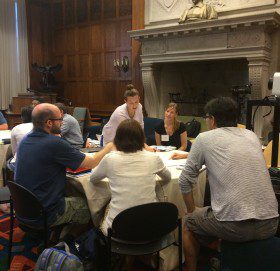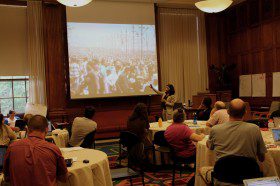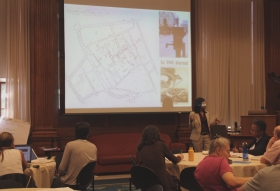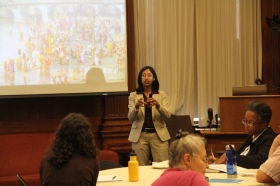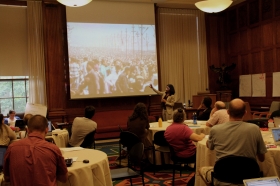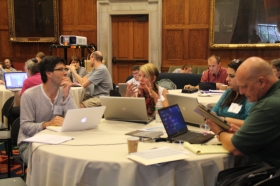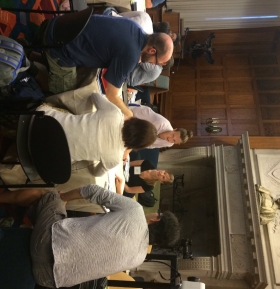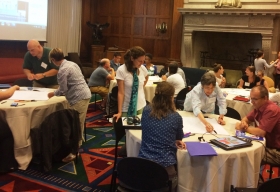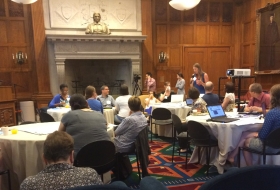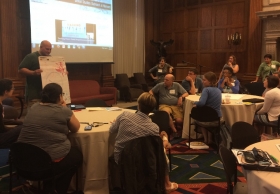From August 4 to 7, 2014, 24 high school and middle school teachers from across the country gathered at Harvard University for a workshop titled ‘Visualizing Global Studies: A Mapping Workshop for Educators.’ The goal of the four-day intensive summer workshop was to teach the educators interested in global studies about using digital media and mapping resources in the classroom.
Geared toward secondary educators in the humanities and social sciences but open to those in all subjects, the workshop featured training in tools for data visualization, map creation, and map-based storytelling, as well as presentations by scholars and experts who are using these resources in their own work. The teachers had the opportunity to spend a day at the Center for Geographic Analysis to learn WorldMap, and also toured the Map Collection at Houghton Library.
The workshop was organized jointly by the Global Studies Outreach Committee at Harvard, which includes SAI, the Center for Middle Eastern Studies, the Committee on African Studies, the David Rockefeller Center for Latin American Studies, the Davis Center for Russian and Eurasian Studies, the Harvard Asia Center and the Harvard Global Health Institute.
Each region was represented through a talk by a scholar or expert who has used mapping tools in their own research. South Asia was represented in a talk by Dr. Pooja Agrawal, MD, MPH, Director, Global Health Education, Section of Global Health & International Emergency Medicine, Assistant Professor, Department of Emergency Medicine, Yale University School of Medicine, and Associate Faculty, Harvard Humanitarian Initiative.
Agrawal spoke about her involvement as a researcher in SAI’s Mapping the Kumbh Mela project, which sent a multidisciplinary team of faculty, students and researchers to Allahabad, India in January 2013 to study the world’s largest religious festival that occurs every 12 years, and draws around 80 million for 6 weeks visitors to form a temporary city. The research project spanned disciplines, and has potential for classroom use in areas of global health, urbanism, architecture, business, and religion.
The public health challenges of the festival were enormous, and Agrawal’s team set out to understand the spread of disease and health outcomes at the festival using technology. For example, they used iPads to keep track of medical records and map disease outbreaks. This health surveillance study hopes to shed light on planning future large-scale human gatherings.
Other presentations, by Harvard professors, Harvard graduate students, and teachers who already use mapping tools in their classroom, covered a range of global topics, including using AfricaMap in the classroom, looking at East Asia with WorldMap, spatial strategies for teaching Russian studies, mapping in post-earthquake Japan, and mapping disease outbreaks.
Participants included teachers from private and public middle and high schools from all across the country, representing Massachusetts, Pennsylvania, Alabama, California, New York, Virginia and Alaska. All of the teachers came to Harvard with an idea for a lesson plan, and were able to use the week to develop their project further with the digital resources.
Throughout the week, the teachers engaged with scholars and practitioners who are already using these tools in their own research. The teachers will now be able to bring these skills back to their own classroom and expand their ability to teach global studies in the classroom. The collaborative aspect of the workshop allowed the teachers to join forces with other educators and share ideas with fellow teachers who are also interested in teaching global studies.
Global Studies Outreach at Harvard is a consortium amongst regional and internationally focused centers and programs at Harvard that share a commitment to conducting educational outreach throughout New England and beyond. The primary goal of the collaboration is to help the general public, and especially K-12 teachers and students, better understand the complex world. The consortium does this by organizing events and programming around global themes and preparing and disseminating resources for classroom use—both of which build on Harvard’s impressive human and material resources.
Check our website in the future for videos from the workshop.
Read more about SAI’s Mapping the Kumbh Mela Project.

